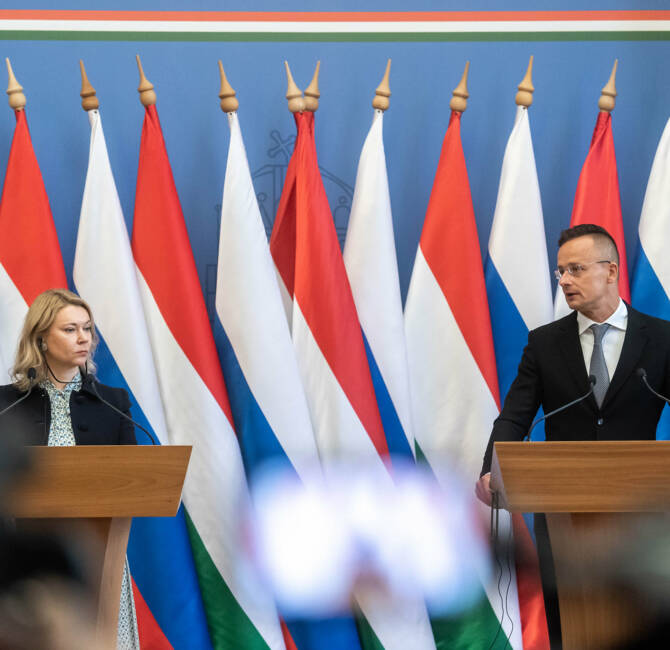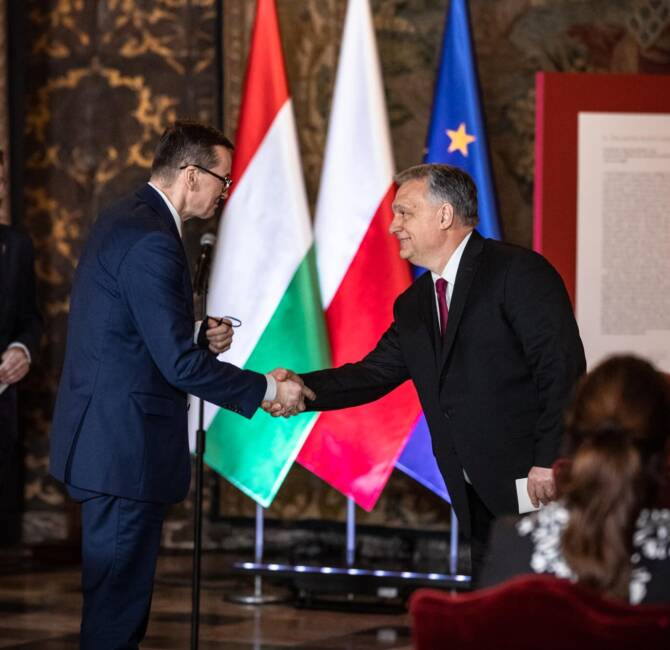European Union – The European Court of Justice (ECJ) decision was expected and it came as no surprise to most commentators. On Wednesday, 16 February, the European Court of Justice dismissed “the actions brought by Hungary and Poland against the conditionality mechanism which makes the receipt of financing from the Union budget subject to the respect by the Member States for the principles of the rule of law”, as one can read in the ECJ’s press release published on that day. While the ruling is a cause for joy and celebration for Eurocrats and the Eurofederalist left, angry reactions were heard from government circles in Budapest and Warsaw.
The Union must be able to defend its values
In its ruling, the ECJ held that
“compliance by the Member States with the common values on which the European Union is founded – which have been identified and are shared by the Member States and which define the very identity of the European Union as a legal order common to those States – such as the rule of law and solidarity, justifies the mutual trust between those States.”
The ECJ’s press release goes on to state that “since that compliance is a condition for the enjoyment of all the rights deriving from the application of the Treaties to a Member State, the European Union must be able to defend those values, within the limits of its powers”, that
“the Union budget is one of the principal instruments for giving practical effect, in the European Union’s policies and activities, to the fundamental principle of solidarity between Member States”,
that “the implementation of that principle, through the Union budget, is based on the Member States’ mutual trust in the responsible use of the common resources included in that budget”, that “ sound financial management of the Union budget and
the financial interests of the Union may be seriously compromised by breaches of the principles of the rule of law committed in a Member State”,
and that a “ conditionality mechanism” is “capable of falling within the power conferred by the Treaties on the European Union to establish ‘financial rules’ relating to the implementation of the Union budget”. Furthermore, the Court stated that “the procedure under Article 7 TEU and the procedure established by the [conditionality mechanism] pursue different aims and each has a clearly distinct subject matter”.
Therefore, in the eyes of the European court, “the powers granted to those institutions by that regulation do not go beyond the limits of the powers conferred on the European Union”.
“A great victory” according to Katalin Cseh (Momentum)
This ruling has naturally been welcomed by liberal and left-wing leaders working at the EU level. Belgian MEP Guy Verhofstadt, former chairman of the ALDE group (now Renew Europe), immediately reacted on Twitter:
“ECJ rejects case of Hungary and Poland and confirms Rule of Law mechanism! Ursula von der Leyen has to act now… She can no longer hide behind the Court! ”
But the latter did not wait for Verhofstadt’s demand to promise that the Commission will act:
“Taking into account these judgments, we will adopt in the following weeks guidelines providing further clarity about how we apply the mechanism in practice. (…) ’Today’s judgments confirm that we are on the right track.”
For her part, the Maltese President of the European Parliament, Roberta Metsola (EPP), said that
“The European Parliament now expects the Commission to apply the conditionality mechanism swiftly.
(…) Values matter, and citizens have the right to know how common funds are used.”
Similar reactions could be heard from the “united” Hungarian opposition. For example, Klára Dobrev (Democratic Coalition, DK) said that
“this ruling is about the EU’s right to punish those who steal EU funds”,
while socialist MEP István Ujhelyi (MSZP) said that the ECJ ruling “will also put an end to the hoarding of EU public funds by Orbán’s mafia system.”
According to MEP Katalin Cseh (Momentum), the Court’s ruling is a “great victory” and, as there is an election campaign ongoing, she warned Hungarian voters that
“if Viktor Orbán remains in government, the Hungarian people and the Hungarian economy will not have access to the resources they deserve”.
Péter Jakab, the leader of Jobbik (a formerly far-right party turned centrist that is now part of the opposition’s 6-party coalition), declared in the same vein: “On 3 April, […] the Hungarian people’s verdict will be our verdict, too, because we deserve these 6 trillion [forints, or approximately 17 billion euros] and cannot entrust so much money to a criminal, especially one who has already plundered his own nation.”
The ECJ ruling comes as no surprise
Interviewed by Do Rzeczy, Polish lawyer and former social-democratic MP Genowefa Grabowska said that “this judgment comes as no surprise. The opinion of the ECJ’s advocate general last December was along the same lines, with the same wording. We did not expect the Court to suddenly change its mind. But she also put her finger on the heart of the matter:
“Nowhere is it written what exactly the rule of law is.”
Grabowska also pointed out that the European Commission was under “crazy pressure from the European Parliament”, where “the Liberals have introduced a rather strange amendment [to the EU budget] in which
they demanded the suspension of funds for the Commission, for its president, and for EU officials because the conditionality regulation is not being applied and the budget payments to the member states are not being withheld.”
“Such irrational behaviour on the part of MEPs can have a chilling effect on the Commission”, Grabowska said.
One more tool to fight Poland and Hungary
MEP Ryszard Legutko (PiS) was not surprised by the ruling, either: “I am no longer surprised by the ECJ’s rulings, because when I started following the case, I realised that
it is an institution which supports the other EU institutions. Not once has it ruled against the Commission, for example, and some of the rulings are even astonishing and an insult to one’s intelligence.”
Mr. Legutko believes that this ruling provides a new tool “for the European institutions to circumvent the law and fight the Warsaw government.”
In an interview on Polish radio, PiS leader Jarosław Kaczyński said for his part:
“We are dealing with an abuse. We are dealing, let us be honest, with fraud by the EU authorities.”
MEP Jacek Saryusz-Wolski (PiS), one of the architects of Poland’s entry into the EU in 2004, expressed concern about the naivety of some Polish conservatives – among them Kaczyński, although Saryusz-Wolski stopped short of naming him – who believe they can keep their heads down as long as Poland receives more money from Brussels than it contributes to the common budget, in the hope that they will be able to effectively oppose the EU’s federalisation when Poland becomes a net contributor. “By then it will be too late. The regime changes [in the EU], including the loss of [national] sovereignty, will be irreversible”, Saryusz-Wolski said.
In the eyes of Deputy Justice Minister Sebastian Kaleta (Solidarna Polska),
it is “a historic day for the European Union. The treaties have been amended by a regulation and a political ruling from the ECJ. From now on, any independent decision by Poland risks being subject to financial blackmail.”
MEP Janusz Kowalski (Solidarna Polska) added to this bitter comment: “This is the end of the EU as we know it! We must defend [our] sovereignty […] The ECJ ruling is an attempt to legalise illegality!
The conditionality mechanism is nothing more than the implementation of the announcement [that] ’Poland and Hungary must be financially starved out’”.
For MEP Patryk Jaki (Solidarna Polska), “This decision actually changes everything in the European Union [which] was founded on the principle [that] the most difficult decisions should be taken together. (…) Since EU politicians could not reach unanimity to punish Poland, they invented such a mechanism. (…)
Poland can now be blackmailed in almost any case.”
An unwritten alternative treaty
Frenchman Jean-Eric Schoettl, former secretary general of the Constitutional Council, France’s constitutional court, wrote on 14 February, in a publication of the Res Publica Foundation: “Invoking the rule of law now plays a strategic role in legitimising the EU institutions’ attacks on national sovereignty.
The notion of the rule of law, mentioned but not defined in the European treaties, allows the Union’s bodies, which are influenced by activist groups, to produce an unwritten alternative treaty. This alternative treaty is in line with the views of a highly organised, politically correct elite who have been using the European lever for the last twenty years to push their agenda.




